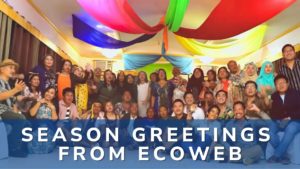Marites Magpali-Dagsaan looked back when she and her husband still earned P500 every two weeks from selling banana from their borrowed farm. That was tough for her and their three children. She narrated on how they tried to live with that amount.
“Apiki gyud kayo ang kinabuhi. Gapugas mi ug mais pangkonsumo. Sagulan lang dayon namo ug humay kay di makakaon ang mga bata labina kung walay sud-an. Makaadto mi sa siyudad kung mokuha og 4Ps. Igo rapud ipalit ug mga gamit sa mga bata.” Marites confided.
(Life was very hard. We planted corn for our food. We mixed it with rice because the children cannot eat it especially if there is no viand. We got the chance to go to the city when we claimed our 4Ps. But it was only enough for the needs of my children.)
Marites is one of the bisayan settlers who came to live with the native Higaunons in the highlands of Rogongon. Rogongon is one of the remote barangays of Iligan City with a population of about 5,000. Population fluctuates as many move to the city to engage in wage-earning activities such as tricycle driving, household help, among others.
Many bisayan settlers also came to Rogongon to work on farms. Just like most of the settlers here, Marites and her husband have no land. They just borrow small patches of land where they plant corn for their own consumption. They could only work on available small patches of land because landowners have already planted them with either falcata trees or abaca.
Marites and her husband used to earn P500 (US $10) every fifteen days from the sale of bananas which they plant in the perimeters of the land that they borrowed. They also live from government subsidy, 4Ps, which she said is barely enough to buy the needs for her children. To get by with their meager income, she mixed some palay rice to corn rice to make their food more appetizing to her children. She said it was difficult for her children to eat pure corn rice especially if they have no viand. They also supplemented their food with bananas and root crops.
Alger Calijan also used to go as far as Marawi City to find menial work. Sometimes he cannot go home to his family for a month. When he felt he was not physically strong as before, he decided to settle back in Rogongon and work as a tenant in a small piece of land owned by a bisayan who lives in the city. Together with his wife, they planted bananas which they harvest every fifteen days.
To augment their small income, Marites and Alger, together with their spouses would work in other farms. Because of the covid lockdown, work is very difficult to come by.
It was during this time that EcoWEB, with the support of Bread for the World, started its organizing of the abaca production guilds. A production guild is a group of around 10 farmers trained in abaca production. The training includes proper harvesting and processing to get the most out from the fiber. The abaca farmers also visited NewTech Pulp, Inc., one of the biggest abaca pulp millers in the world to learn more about the abaca industry.
Alger was the first to be employed to help in the abaca fiber buying operation of EcoWEB. This buying operation is part of the establishment of an abaca-based social enterprise to help abaca farmers get a good price for their fiber.
The abaca farmers also received stainless-steel stripping and tuxy knives to help in their fiber extraction.
Needing more help on the buying operation, Alger asked Marites and her husband to join the workforce. She works as sorter of fiber while Alger and Marites’ husband do the harder work of folding and baling.
Now, Marites and her husband earn a combined income of P500 per day.
“Makapalit na tawon mi ug tamban. Karne pud ginagmay kung naay suroy,” Marites revealed.
(Now we can buy hearing (fish) for our viand. And meat, too.)
Alger and his wife also earn that same amount.
“Ako lang panghinaut nga molambo pa ni nga negosyo,” Alger wished.
(I wished this enterprise will grow.)
Both of the families see the future with more hope as they are certain that they are already capable of making their children finished their education.
This project primarily aims to contribute to the sustainable development of the three Ancestral Domains of Indigenous People in North-Western Mindanao.
Related articles:
Women deco machine operators: Can a woman play a man’s role in abaca production?
Work opportunities amid covid-19 quarantine
Quarantine enables IP farmers to expand their farms
Fighting Covid-19: EcoWEB gears up for the incoming abaca demand for PPE


Done reading
Salute to EcoWeb.
You are a blessing to the needy…
More successful projects